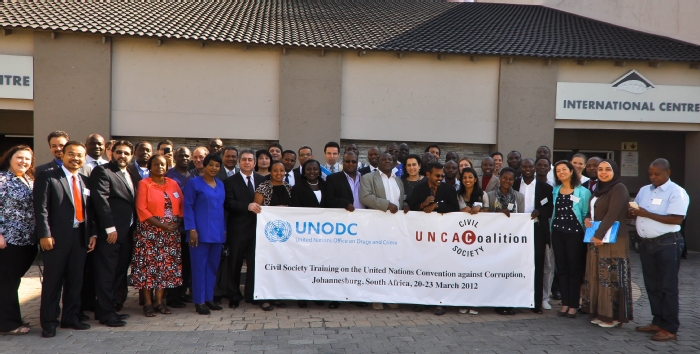Civil Society Organisations trained on the United Nations Convention Against Corruption in South Africa
Johannesburg - From 20-23 March 2012, the United Nations Office on Drugs and Crime (UNODC) together with the UNCAC Coalition hosted a training workshop for civil society organisations on the Review Mechanism for the United Nations Convention Against Corruption (UNCAC). The 4-day training workshop took place in Johannesburg and was attended by over 50 participants and experts, representing some 30 countries across Africa and Asia.
The Convention is the only legally binding international anti-corruption instrument. Adopted by the UN General Assembly in October 2003, it is the first global framework to harmonise anti-corruption efforts worldwide. The convention entered into force in December 2005 and currently has 159 State Parties (including South Africa). It is unique not only in its worldwide coverage, but also in the extensiveness and detail of its provisions. It is widely recognised as the most promising initiative to curb the scourge of corruption.
In November 2009, the 3rd UNCAC Conference of States Parties adopted a review mechanism for the UN Convention against Corruption. The review of implementation of the Convention is a crucial process, as it helps States parties to identify challenges and good practices. The resolution adopting the review mechanism encouraged governments to include civil society and private sector inputs to their self-assessments and left it optional for governments to decide whether to allow a country visit and whether to involve civil society and the private sector to make inputs during the country visits.

Civil Society Organisations play a vital role in the fight against corruption
The workshop aimed to develop participants' capacity to contribute to the UNCAC Review Mechanism by providing substantive expertise in UNCAC provisions, delivering training in methodologies for country reviews and enabling participants to reproduce the training at national and regional levels. Participants were also trained on how to better work with the private sector to prevent corruption.
The opening address was delivered by UNODC Regional Representative for Southern Africa, Mr. Mandiaye Niang, who acknowledged the importance of the UNCAC provisions in fighting corruption and commended the Coalition for the work it has undertaken since its establishment. He noted that
" Because corruption is a globalised crime, the Convention takes the fight beyond the boundaries of a given country. It fosters harmonised legislation and international cooperation. All too often we have seen people indulging in corruption and enjoying the proceeds of their crimes in safe havens. The UNCAC provides an effective response to make sure that the world becomes too small a place for those criminals to hide".
Mr. Niang called on workshop participants to engage with and assist their respective Governments to implement the Convention and free themselves of corruption; educate the public about Governments' responsibility to be corruption-free; raise awareness within the public, the media and Government about the cost of corruption to key services such as health and education; and educate the public on their role in helping to bring an end to corruption.
Mr. Niang's message was followed by an address by Andrea Figari, Global Programme Manager at the Secretariat of Transparency International Secretariat. Ms. Figari highlighted the important role to be played by non-government counterparts in fighting corruption. However, she stressed that this will require a concerted long term effort on the part of civil society actors, patience and persistence.
Throughout the duration of the training, participants from Sub-Saharan Africa, North Africa and Asia, actively exchanged and discussed experiences. While these often differed widely from country to country, they often showed similar challenges especially on their experience in counteracting with their governments, accessing information, which should be publicly available as by the Convention, difficulties with funding, etc.
The participants lauded the training and efforts of the UNCAC Coalition as well as UNODC and pledged to continue tirelessly to make their countries and the world corruption-free.
For more information please visit: